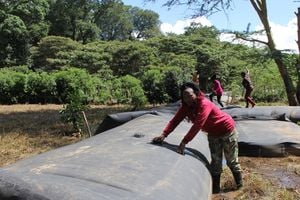Tana River blacksmith keeps alive ancient skill of metal art

Athman Saed teaches his son how to cut metal at his working station in Old Town, Tana River County
The ancient skill of turning metal into implements may be long forgotten and replaced by modern technology, but for Athman Saed, old is gold.
The 65-year-old has kept alive the sunset industry that has earned him a living for the past 45 years.
Mr Saed is an established hand craftsman in Old Town, Galole constituency, where he turns metal into various tools.
“I inherited this skill from my father. I wanted to carry on this old craft in memory of him because the money he earned paid our school fees,” he says.
He started blacksmithing at the age of 24 after trying to find a regular job in vain.
The trained chef tried his hands at various ventures in Nairobi and Mombasa but did not feel contented and so he moved back home.
“The city is crowded and full of rowdy people. The competition was very high and you could go to bed with a job and wake up without one,” he recounts.
He said he realised he had a unique skill in metalwork that could generate a good income compared with what he used to do in the city.

Athman Saed (green T-Shirt) with his son hammer a metal rod to shape at their working station in Old Town, Galole Constituency, Tana River County.
He notes that blacksmithing requires a lot of effort. It is not glamorous and so not everyone is willing to pick up the trade, and hence there is little competition.
He begins his work each day at 8am, his tools being two pieces of cement bags tied to a metallic pipe and charcoal.
In a single day, he takes orders from farmers, hunters and masons who prefer his handmade tools, and as a result, he strives to deliver for his clients.
“I deliver at least six items in a day as per the list. If I promise a client that I’m going to deliver the item by the end of the day, I must do that,” he says.
Mr Saed heats his metal to craft out arrows, spears, hoes, mallets, nails, axes and drills, which traders then buy to sell to their own customers.
He curves out a spear for Sh800 and a hoe for Sh450, while an arrow goes for Sh250 and a mallet Sh500.
On a good day, he makes Sh6,000 and Sh1,200 when the season is low.
“Most of my sales are good during the rainy season. That is when most people buy hoes and spears, but when it’s dry like now, sales are very low,” he says.
He has built a home for his family and pays school fees for his children with proceeds from his trade.
His clients find the implements he makes more reliable and durable than industrially produced items.
“His items don’t break; they are very strong. Some of these industrially produced items cannot stand work in very tough areas like the handmade tools can,” said farmer Hassan Malibe.
Mr Malibe notes that the hoes he buys from Mr Saed do not bend when they hit stones on the farm and rarely lose their sharpness.
Nevertheless, challenges abound. Mr Saed suffers burns during work, for example.
His hands and legs have been injured by fire, but he keeps going.

Some of the tools already made by Athman Saed at his working station in Old Town, Tana River County.
The materials for his job have also become scarce and sometimes he also lands on fake metal thus affecting his productivity.
“Not every metal in the market is worthy. Some are very weak and unfit for making good tools,” he says.
The blacksmith intends to pass on the skill to his son when he retires, and so he involves him in most of the work.
He says no one can steal the skill from him or solicit a bribe to provide him favours.




